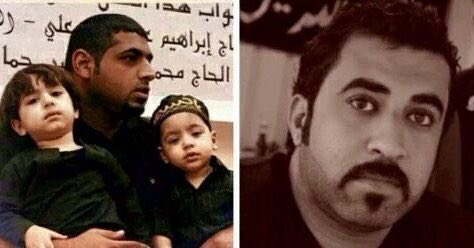Three Bahraini human rights organisations said that upholding the death sentences against torture victims Mohammed Ramadhan and Hussain Moussa, after an unfair trial, confirm that the justice system in Bahrain is a sham. It excels at producing “political persecution” sentences, and always takes the path of “false justice”, which the non-independent judicial authorities in Bahrain are committed to implementing.
The three human rights organisations, SALAM for Democracy and Human Rights (SALAM DHR), the Bahrain Forum for Human Rights (BFHR) and the Gulf Institute for Democracy and Human Rights (GIDHR), indicated that the issuance of these death sentences today, on Wednesday 8 January, confirms that all the Bahraini authorities’ claims of responding to international recommendations to improve the human rights situation are false.
The organisations said that on 18 February 2014, the authorities arrested Mohammed Ramadan at his place of work. On the same day, the authorities carried out a raid on a house in Samaheej where they detained Hussein Moussa. They also detained ten others in connection with the killing of policeman Abdul Wahid Sayed Mohammed Faqir, as well as the attempted murder of others by way of a bombing in Dair, four days earlier on 14 February 2014, according to the official version.
The organisations added that following a flawed trial process, on 16 November 2015, an appeal court sentenced both to death. In May 2017, the United Nations Committee against Torture (UNCAT), in paragraph 12c of its Concluding observations on the second and third periodic reports of Bahrain, adopted on 8 and 9 May 2017 (reference CAT/C/BHR/CO/2-3), expressed “grave concern” about:
“The situation of Mohammed Ramadhan and Hussain Ali Moussa, who face the death penalty and are said to have been convicted on the basis of confessions extracted under torture (arts. 2, 11-13 and 15-16)”.
The organisations further said that in paragraph 13e, the UNCAT called on the Government of Bahrain to:
“Bring to the attention of judges that investigations and a new trial of Mohammed Ramadhan and Hussain Ali Moussa will be needed if coerced confessions were taken into account as evidence during their previous trial, guarantee the two men effective assistance by legal counsel at all stages of interrogation.”
The three organisations explained that on 22 October, 2018, the Bahraini Court of Cassation overturned this verdict on the basis of medical reports that appeared to prove that the authorities obtained confessions from the two men as a result of torture. The Court of Cassation returned the cases to an appeal court for re-examination. However, the High Criminal Court of Appeal upheld the death sentences against them today, 8 January, 2020.


 العربية
العربية Français
Français Deutsch
Deutsch